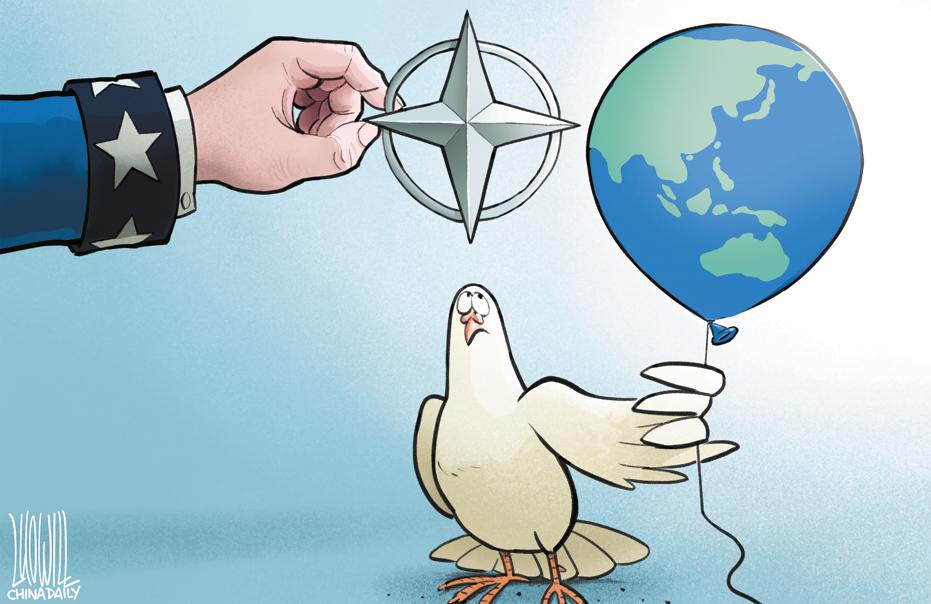NATO just perpetuates narrative of militarization
By Aabis Saykhum | China Daily Global | Updated: 2024-05-29 09:10

The commemoration of the North Atlantic Treaty Organization's 75th anniversary this year has sparked contemplation regarding its contentious legacy.
Born from Cold War tensions, NATO's continuation defies logic, serving primarily as a tool for US hegemony. Moreover, NATO's actions contribute to global destabilization, heightening nuclear risks and fostering confrontation in Asia. As the alliance persists, it perpetuates a narrative of militarization and division, rather than fostering genuine peace and cooperation.
In recent decades, a discernible trend has emerged with the United States and NATO steadily expanding their influence across the globe, particularly in regions such as the Far East and the Asia-Pacific. This expansionist agenda appears directed toward the East, encroaching upon territories that include Russia, the Caspian Sea and the Middle East. Such maneuvers raise concerns about the geopolitical balance and security dynamics in these regions.
NATO's recent shift in rhetoric toward China, as outlined in Secretary General Jens Stoltenberg's Annual Report released on March 14, underscores a concerning trend in global geopolitics. The narrative propagated by these entities portrays China as a "systemic challenge" and Russia as a malign influence, yet this rhetoric belies their own shortcomings and reluctance to confront present realities. Rather than embracing equality and cooperation, they cling to outdated paradigms, resisting the inevitability of a more inclusive global order.
While NATO traditionally focused on Russia as its primary adversary, the alliance's pivot toward China reflects a broader strategy of finding or fabricating external threats to justify its continued existence and expansion. This trend poses significant risks to global security and peace.
NATO's evolving stance toward China has become a focal point of geopolitical analysis, with political analysts cautioning against what they perceive as a dangerous trend toward targeting Beijing as an external enemy.
However, not all NATO members share the same level of hostility toward China. Many European members prioritize economic concerns over global power struggles and are less inclined to engage extensively in the Asia-Pacific militarily. As such, the anti-China sentiment within NATO does not necessarily represent a consensus among member states.
The portrayal of China as a looming threat by NATO appears to be driven largely by the US' selfish intent to protect and safeguard American strategic interests in the Asia-Pacific, especially in the South China Sea, rather than genuine concerns shared by all member states. Any potential friction between China and NATO is often instigated by the US through its increased military activities and interference in matters affecting China's sovereignty and national security, such as the South China Sea and Taiwan.
Many European member states maintain deep and interconnected relationships with China, leading to divergent views on the alliance's approach toward Beijing. Attempts by the United States to pivot NATO's focus toward Asia-Pacific cooperation to counter China are met with internal dissent, particularly from European members who prioritize maintaining the alliance's traditional focus on European affairs. As NATO's "ambition" takes on a new guise-a sprawling, digitally-enhanced alliance strategically positioned to confront a perceived threat — China. Yet, this vision seems more a manifestation of US hegemony than a collective European endeavor.
Looking ahead, European leaders grapple with the looming shadow of the US election in November. At the same time, considering the current drive to expand NATO into Asia, it's essential to discern the true motivations at play.
Europe's security interests are not threatened by a peaceful, prosperous China integrated into the global economy. Rather, Europe should focus on nurturing trade and investment ties with China and East Asia to harness its economic dynamism. The push for NATO's presence in Asia only serves the interests of the United States and its military-industrial complex.
This expanded NATO would tighten US grip on Europe, Australia, Japan and South Korea, prioritizing the purchase of US military equipment and extracting more funds from member states. Such a move risks further de-industrializing these nations, eroding their autonomy and alienating them from their regional counterparts.
The relentless pursuit of expansion and dominance by a minority of Western nations, spearheaded by the US, poses a significant hurdle to the vision of a new global order founded on principles of sovereign equality and non-interference. These nations appear oblivious to the evolving dynamics of a multipolar world, clinging to the illusion that they can thwart or reverse historical trends through force, even resorting to nuclear means. Such doctrines pose grave threats to global peace and development, endangering the very fabric of humanity.
It is imperative to challenge and counteract these dangerous ideologies, advocating instead for cooperation, mutual respect and adherence to international law. Only through collective efforts to uphold the principles of equality and non-interference can we hope to navigate the complexities of our interconnected world and foster a more harmonious and prosperous future for all.
The author is a geostrategist and political analyst based in Lahore, Pakistan.
























